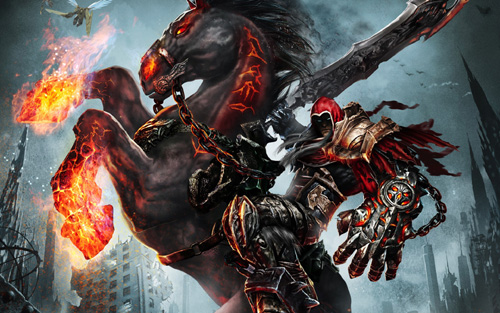
Each time a mass shooting occurs in America – an event to which we are becoming disturbingly accustomed – conservative pundits swarm to their nearest television studios to offer solutions. As a moral society, they shout from their soapboxes, we must make every effort to stop the quick and easy sale of dangerous...ahem...video games. Forget semi-automatic weapons – those poor maligned implements of patriotism – the real devils are those dastardly Xbox and Playstation consoles!
The idiocy of this political smokescreen is obvious. But there is also something a bit more interesting going in video games, which usually goes unnoticed. Those commentators who inveigh against the moral degradation of American youth, and its departure from ‘traditional’ (read: Christian) values, clearly haven’t looked very closely, let alone played, any of these supposedly soul-destroying video games. If they had, they might notice a curious fact. Many of the most popular, and indeed the most violent, video games are awash in explicitly religious themes and symbols.
The plots – yes video games have plots these days! – of best-selling game franchises such as Halo, Assassin’s Creed, Heavenly Sword, Gears of War, and Darksiders all draw extensively upon the Bible. While Genesis provides many of the allusions, unsurprisingly it is the Book of Revelation which rules the day. With its gory amalgam of rampaging beasts, devastating military campaigns, and natural disasters, the book reads like a game designer’s dream. In gaming parlance, John of Patmos serves up a perfect synthesis of hack and slash and survival horror. God may not play dice, but if John is a reliable guide, the Lord does seem to enjoy a good third person shooter.
In Gears of War, designed by Epic Games for Xbox 360 in 2006, humanity is threatened by the Locust Horde, an alien race who tunnel to the surface on Emergence Day (E-Day) and begin sucking humans into their subterranean lair. The game’s ashen planet seems to channel the words of Revelation 9.2-3: “the sun and the air were darkened with the smoke from the shaft. Then from the smoke came locusts on the earth, and they were given authority like the authority of scorpions of the earth.” Even the horde’s snarling countenances seem to owe something to Revelation, in which the locusts’ “faces were like human faces...and their teeth like lions’ teeth; they had scales like iron breastplates” (9.7-9).
Darksiders, developed by Vigil Games in 2010 for Xbox 360 and Playstation 3, engages with John’s prophecies in even more detail. The hero of the game is War, one of the Four Horsemen of the Apocalypse. War arrives before his appointed time, prior to the breaking of the appropriate seal. Unbeknownst to the horseman, the Apocalypse has been hastened prematurely by the militant angels Abaddon and Azrael. Rather than victory for the forces of good, the forces of Hell gain the upper hand amidst the chaos. It is up to the horseman, controlled by the game’s player, to restore balance to the cosmos.
So just what lessons are such games teaching to those ‘impressionable minds’ we hear so much about from commentators? Even infamous games like Grand Theft Auto, maligned for inciting hooliganism, satirize America’s obsession with guns and violence just as much as they glorify it. And as we have seen, some of the industry’s most successful creations involve a Christian quest, in which the gamer must play his or her part in order to ‘win’ salvation for humanity.
Sure there is still a lot of hacking and slashing that happens on route, but the message of these games is far more complicated than a simple endorsement of random violence. The fight for goodness, justice, and at the very least survival, is integral to the vast majority of role-playing games. And along the way, gamers become immersed in worlds studded with as many biblical names, stories, and concepts as a Sunday school chalkboard.
The irony of evangelical attacks on video games is particularly juicy in the case of eschatological thrillers like Gears of War and Darksiders. The grim, visceral imagery of these games is not the recent invention of malevolent secularists as much as it is a continuation of a tradition of the Christian apocalyptic. The creators of these darkly captivating digital worlds are simply following in the hallowed footsteps of Memling, Brueghel, and Bosch.
The titillation we feel in a gallery, swallowed up in a scene of sulphur and brimstone, may have a more respectable provenance, but it is not so different from the thrill of murdering a locust horde on a shimmering flat-screen TV. In the end, playing at the apocalypse is nothing new, and the greater danger may be in dismissing it than encouraging it. If John’s vision does come to pass, a spotty teenager with a little virtual experience expulsing the Devil’s minions might come in handy. Perhaps more imminently, a healthy dose of the apocalyptic reminds us that religion is not just a tidy device for encouraging good table manners, it can also get messy. Video games are not a reliable predictor of our actions in the real world, but they do paint a convincing picture of the worlds we imagine, for better or worse.

